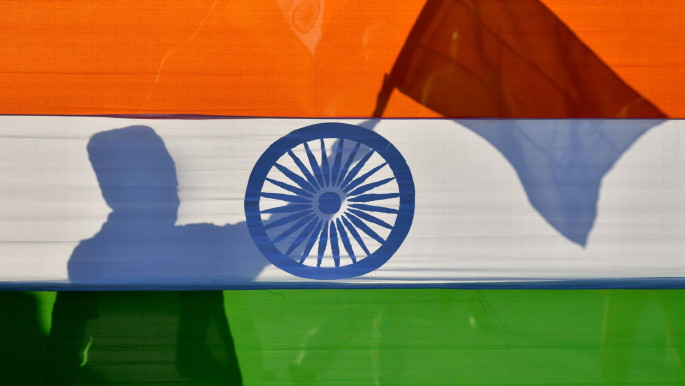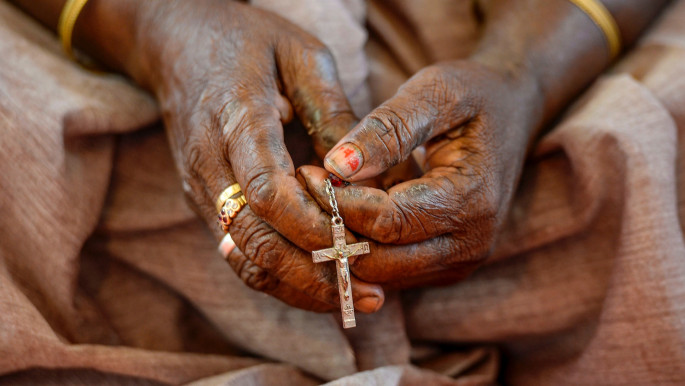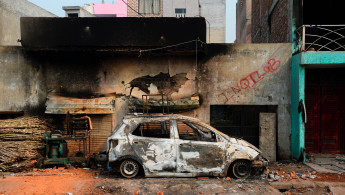'We have no hope for justice': A year on from Delhi's anti-Muslim riots
Mohamad Vakeel, who ran a small grocery store on the ground floor of his three-story house, locked the entrance of his home with an iron chain and hurried his family to the terrace. The day had been spent in uncertainty amidst incidents of communal violence in surrounding areas.
"Soon a mob came to our entrance and attempted to barge in, they pelted stones, some shops and houses in the neighbourhood were also set on fire," recalls Vakeel, who was trying to calm down his wife, three kids and other relatives hiding on the terrace. "They were shouting Jai Shri Ram (Hail Lord Ram) and abusing Muslims."
During a brief lull, Vakeel started searching for a safe passage. He looked down an alleyway to see if it was safe for his family to move.
"Within no time I was hit by a bottle on the head. Acid burned my eyes, piercing my face and body," recalls the 52-year-old, who came to live in New Delhi over three decades ago in search of work after selling his small patch of agricultural land in a village in the neighbouring state of Uttar Pradesh.
While Vakeel was writhing in pain, the mob in the alleyway vandalised his shop before leaving. The family came out and took shelter on the terrace of a nearby three-story mosque. But within an hour the mob came back again and stormed the mosque, setting fire to Vakeel's house.
 |
Between 25-26 February in 2020, northeastern areas of India's capital were hit by the worst communal riots in four decades |  |
"We were shivering while the mob started vandalising the mosque," said Mohammad Waseem, the 18-year-old son of Vakeel. "My father was bleeding but unconscious. We knew they would come for us soon and we would all be killed."
Between 25-26 February in 2020, northeastern areas of India's capital were hit by the worst communal riots in four decades. Hindu mobs rampaged through Muslim neighbourhoods. The rioters committed widespread acts of looting, plunder and arson, turning hundreds of Muslim homes and shops to ashes. The mobs also targeted mosques. At least 53 people were killed.
 |
|
| Read more: How India is clamping down on Muslim activists under the cover of coronavirus |
Unable to bear the pain, Vakeel lay unconscious for hours. "Around 3am, as the mosque was burning, the mob left after throwing a gas cylinder inside and a massive blast shook the building," Waseem recalled, adding that "it felt like the entire structure would crumble."
Waseem took his injured father and family and made their way through the fire, they walked for two kilometres on foot and reached Chaman Parak, a Muslim-majority area.
"It was only at 7am that we could take my father to a nearby nursing home," recalled Waseem.
A year later, Vakeel's face is disfigured and he has been left completely blind. Sometimes, he says, when he talks for too long his head aches and tears roll down from his closed eyelids. He goes to the bathroom holding Waseem's hand.
It has been around two weeks since the family returned to their house, which has been reconstructed by a Muslim organisation, Jamiat Ulema-e-Hind. Vakeel and his family lived in a single rented room for a year. The government not only failed to protect people from violent mobs but also looked the other way when they robbed everything.
"It was because of NGOs and the Jamiat that we managed to live for a year and return to our homes," said Vakeel who, like some other victims, received 200,000 Rupees ($2,700) in government compensation, which he had to spend on his hospital bills.
 |
The police have been accused of siding with the Hindu mobs during the riots, firing teargas shells into mosques and later destroying CCTV cameras to erase evidence |  |
Vakeel and other victims of the Delhi riots blame the Hindu nationalist government of Prime Minister Narendra Modi for instigating the mobs. It was widely reported that on 23 February a speech by Kapil Mishra, a local leader of the Bharatiya Janata Party in northeast Delhi, sparked the riots. Mishra had exhorted his followers to clear Muslim crowds, who were protesting against the discriminatory citizenship law, and "teach them a lesson".
The law, the Citizenship Amendment Act (CAA), which was enacted by the Modi government in December 2019, grants citizenship to migrants from neighbouring countries living in India but it specifically excludes Muslims. Critics say the law goes against the secular fundamentals of the Indian constitution.
 |
|
| Read more: Narendra Modi's Potemkin democracy |
Muslims fear that the law, coupled with the potential citizenship test under the National Register of Citizens, will lead to their large-scale disenfranchisement.
Vakeel has no hopes of justice as long as Modi is in power. "Since this government assumed power, the situation has become bad for us," said Vakeel who is completely bed-ridden since the attack. "We have no hope for justice."
 |
Victims of the Delhi riots blame the Hindu nationalist government of Prime Minister Narendra Modi for instigating the mobs |  |
Waseem has set up his father's grocery store again to support his family but the atmosphere in Shiv Vihar has changed. Since the riots, divisions between Hindus and Muslims have deepened and social interactions between the two communities have vanished. "Hindus no longer come to our shop," said Waseem, adding that he had never seen this level of tension before the riots.
The police have been accused of siding with the Hindu mobs during the riots, firing teargas shells into the mosques and later destroying CCTV cameras to erase evidence of them playing a partisan role.
 |
|
| Read more: In Modi's Hindu nationalist India, anti-Christian violence is on the rise |
New Delhi's police force also stands accused of running biased investigations into the riots implicating Muslim activists in cases of alleged conspiracy. The victims also allege that complaints against their attackers have been dismissed.
"I named my attacker in the complaint but the police are yet to register a case," said Khurshid Saifi, a 39-year-old who was left blind in one eye after being attacked. "My attackers are roaming free."
Human rights groups have castigated the Modi government for failing to provide justice to the Muslim victims of the Delhi riots, alleging that the government is "undermining equal protection under the law".
"The government has not only failed to protect Muslims and other minorities from attacks but is providing political patronage and cover for bigotry," said Meenakshi Ganguly, South Asia director at Human Rights Watch, in a recent report.
Aakash Hassan is a Kashmiri journalist. Formerly a correspondent with CNN-News18, his work has appeared in The Caravan, TRT World, and PEN/Opp.
Follow him on Twitter: @AakashHassan



